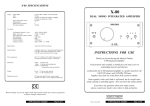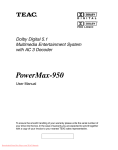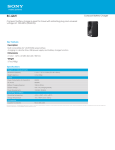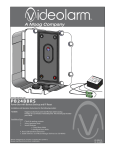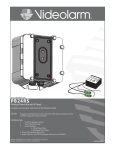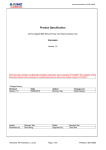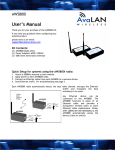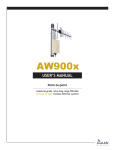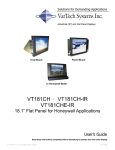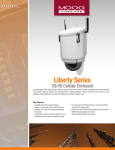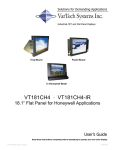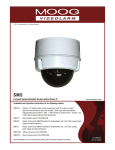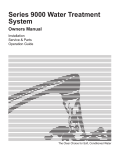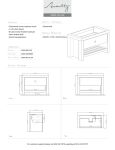Download User`s Manual - Moonblink Communications
Transcript
AW-D900 User’s Manual Thank you for your purchase of the AW-D900 Wireless Ethernet Dome. The AvaLAN wireless radio functions in place of an Ethernet cable and provides a transparent wireless point to point Ethernet cable replacement. AvaLAN radios automatically sense the type of network client device and cross-over cables are never necessary. The AW-D900 Kit Contains: (1) Videolarm (FDW75C2N) outdoor dome housing with heater/blower (2) 120VAC to 24VAC/40Va transformers (1) AW-900x Mating radio transceiver (2) AW2 2.5dBi omni antennae (1) 120VAC to 9VDC power supply (1) 30ft outdoor grade CAT5 cable (1) POE (Power over Ethernet) injector (1) Antenna/radio wall mounting kits Initial Setup: Camera: 1. Setup your network camera while attached to a network. Please refer to the manufacturer’s instructions provided by the camera. 2. Ensure the video from the camera can be viewed on a networked PC. 3. To optimize the camera for use over a wireless link please see camera performance FAQ at www.avalanwireless.com/support. Dome: 1. Install the Videolarm FDW75C2N/AW-D900 dome housing using the supplied 120VAC to 24VAC transformers. Please contact Videolarm for installation support on the dome housing. www.videolarm.com 1-800-554-1124. 2. Mount the network camera within the dome housing according to Videolarm’s instructions. 3. Attach antenna to the dome. Wireless Setup: 1. 2. 3. 4. 5. 6. Install in the AW-900x. Attach the antenna to the AW-900x (see Appendix A for polarization guide, page 6) Attach the white power injector to the end of the Ethernet Cable Attach the 120VAC to 9VDC power supply to the white power injector. Connect an Ethernet cable from the injector to the network (or directly to a PC). The AvaLAN radios automatically select the best radio channel, encrypt the Ethernet data and transports the data wirelessly to its mate. 7. Use an internet browser on a networked PC to view the video from the camera. Ensure that the subnet/IP addresses of the PC and the camera are compatible. 8. For radio/network troubleshooting see page 3. Power supply Ultra Long Range Digital Ethernet 900 MHz Radio Link 2x 120VAC to 24VAC (Included) 24VAC AW-900x Mate Ethernet RJ45 10BT Power over Ethernet Injector (Included) Power supply 120VAC to 9VDC 9-48VDC (Included) LED display: The AW-900x Mate has a 16 LED display to display the status of the device. These LEDs can be viewed by removing the cover. Name Power RF Link RF TX RF RX Eth Link Activity 1 (channel) 2 (channel) 4 (channel) 8 (channel) Link Quality Meter The more LEDs that are lit the higher the link quality. Function Unit has power and has successfully booted. The radio has successfully synchronized with it partner. Radio transmission is occurring. Radio reception is occurring. The Ethernet Port has a valid Ethernet connection The AW900m is processing data By adding the numbers that are lit the user can determine the current radio channel. 1 903.12500 MHz 2 905.20833 MHz 3 907.29167 MHz 4 909.37500 MHz 5 911.45833 MHz 6 913.54167 MHz Color Red Green Green Green Green Green Green 7 915.62500 MHz 8 917.70833 MHz 9 919.79167 MHz 10 921.87500 MHz 11 923.95833 MHz 12 926.04167 MHz Excellent link quality – Green Very good link quality – Green Good link quality – Amber Fair link quality – Amber Poor link quality – Red No link quality - Red Troubleshooting: See the online installation tutorial and FAQ at www.avalanwireless.com No Power LED: Check the power connections. No Radio Link LED: The radio is looking for its matched partner. If both units are powered up and the Power LEDs are active they may be too far away to create the radio connection. Try other locations that may have a less obstructed path or try to reorient the antennas. Yagi type antennas get their best range when they are oriented to point directly at each other with the antenna elements oriented in the same plane (eg. vertically or horizontally) Radio LINK LED ON but Link Quality Indicator is low: The units may be too far away to create a good radio connection. Try other locations that may have a less obstructed path or try to reorient the antennas. No Ethernet LINK LED: Check your network connections. Installing Multiple systems in close proximity: See the online installation tutorial and FAQ at www.avalanwireless.com Support Email: [email protected] Support helpline: (650) 384-0000 Advanced Settings: Automatic frequency selection mode (DIP switches – all OFF for automatic mode) The AW-900x is designed to automatically select and continuously optimize the performance of its radio channel. The radio channel is monitored to ensure it is providing low error rates necessary for successful radio transmission. In the event that the error rate rises, the AW-900x will autonomously change to a new channel. There are 12 non-overlapping channels. Manual frequency selection mode To restrict the operation of the AW-900x to a subset of the 902-928 band, the user may activate a manual selection mode that allows the radio to automatically choose the best channel within a grouped subset of the 12 available channels. This is enabled by the 8 position DIP switch on the master unit. These settings allow the AW-900x to operate on the optimal channel in one of three subsets, LOW 4, MID 4 or HIGH 4. The DIP switch setting are: Channels LOW 4 - 1,2,3 or 4 MID 4 - 5,6,7 or 8 HIGH 4 - 9,10,11 or 12 DIP Setting 2 On / 3 Off 2 Off / 3 On 2 On / 3 On Frequency 902-910 MHz 910-918 MHz 918-927 MHz Or - the user may wish to select a specific channel. This can be done by setting DIP switches 5-8 as shown in the table below. [Turn DIP 2 Off / 3 Off] Channel 1 2 3 4 5 6 7 8 9 10 11 12 DIP Setting 5 On / 6 Off / 7 Off / 8 Off 5 Off / 6 On / 7 Off / 8 Off 5 On / 6 On / 7 Off / 8 Off 5 Off / 6 Off / 7 On / 8 Off 5 On / 6 Off / 7 On / 8 Off 5 Off / 6 On / 7 On / 8 Off 5 On / 6 On / 7 On / 8 Off 5 Off / 6 Off / 7 Off / 8 On 5 On / 6 Off / 7 Off / 8 On 5 Off / 6 On / 7 Off / 8 On 5 On / 6 On / 7 Off / 8 On 5 Off / 6 Off / 7 On / 8 On Center Frequency 903.12500 MHz 905.20833 MHz 907.29167 MHz 909.37500 MHz 911.45833 MHz 913.54167 MHz 915.62500 MHz 917.70833 MHz 919.79167 MHz 921.87500 MHz 923.95833 MHz 926.04167 MHz Site survey mode (DIP switch 4 - default is OFF for normal operation) In this mode the AW-900x can perform a site survey. With this mode activated the radios send and receive at 100% capacity by transceiving self-generated simulated data. The installer can monitor the Link Quality display to assess channel quality while optimizing antennae orientation. The installer can manually select each channel to evaluate performance and identify the best channels for operation. By identifying channels with poor performance it is possible to identify possible interferers and use “manual frequency selection mode” to avoid portions of the band or select a fixed operating frequency. Note: Ethernet traffic does not get transported while the radios are in this mode. Power save mode (DIP switch 1 - default is OFF for normal LED display) In this mode the display LEDs can be turned off for low power applications (solar). Technical Specifications: (typical) Characteristic RF transmission rate: Throughput: Output power: Receive sensitivity: Latency: Jitter: Voltage Range: AW-900x AW-D900 Power Consumption: AW-900x AW-D900 Radio channels: Automatic frequency select: Manual frequency mode: Status LEDs: Error correction technique: Adjacent-band rejection: Temperature range: AW-900x AW-D900 Power over Ethernet: Specification - description 1.5 Mb/s 935 Kb/s +21dBm – (4 Watts EIRP with 15dBi antennae) -97dBm at 10e-4 BER (-112dBm with 15dBi antennae) < 2ms – assuming a dedicated wireless link to client device. ±0.5ms – depending upon packet size, interference and SNR. 9-48VDC 24VAC TX 1.3Watts and RX 0.6Watts over 9-48VDC input voltage. 55Watts (including 20 watt heater) 12 Non-overlapping Yes – radio channel automatically selected and adaptively optimized Yes Power, RF Link, Ethernet Link, Traffic, RF RX, RF TX, 4/Channel and 6/Link Quality Sub-block error detection and retransmission SAW receiver filter attenuates cellular and pager interference. -40°C to 70°C -30°C to 50°C - Depends upon temp range of Camera Heater turn on at 10°C off at 27°C, Blower on at 45°C off at 27°C Use with 9VDC to 48VDC POE systems with lines 4/5 positive, 7/8 ground. Product limited warranty: This product is warranted to the original purchaser for normal use for a period of 180 days from the date of purchase. If a defect covered under this warranty occurs Avalan will repair or replace the defective part, at its option, at no cost. This warranty does not cover defects resulting from misuse or modification of the product. Compliance Statement ( Part 15.19 ) This device complies with Part 15 of the FCC Rules. Operation is subject to the following two conditions: 1. This device may not cause harmful interference, and 2. This device must accept any interference received, including interference that may cause undesired operation. Warning ( Part 15.21 ) Changes or modifications not expressly approved by the party responsible for compliance could void the user’s authority to operate the equipment. RF Exposure ( OET Bulletin 65 ) To comply with FCC RF exposure requirements for mobile transmitting devices, this transmitter should only be used or installed at locations where there is at least 20cm separation distance between the antenna and all persons. Information to the User - Part 15.105 (b) Note: This equipment has been tested and found to comply with the limits for a Class B digital device, pursuant to part 15 of the FCC Rules. These limits are designed to provide reasonable protection against harmful interference in a residential installation. This equipment generates, uses and can radiate radio frequency energy and, if not installed and used in accordance with the instructions, may cause harmful interference to radio communications. However, there is no guarantee that interference will not occur in a particular installation. If this equipment does cause harmful interference to radio or television reception, which can be determined by turning the equipment off and on, the user is encouraged to try to correct the interference by one or more of the following measures: --Reorient or relocate the receiving antenna. --Increase the separation between the equipment and receiver. --Connect the equipment into an outlet on a circuit different from that to which the receiver is connected. --Consult the dealer or an experienced radio/TV technician for help. Appendix A - Antenna Alignment Guide V4 August 9, 2006









